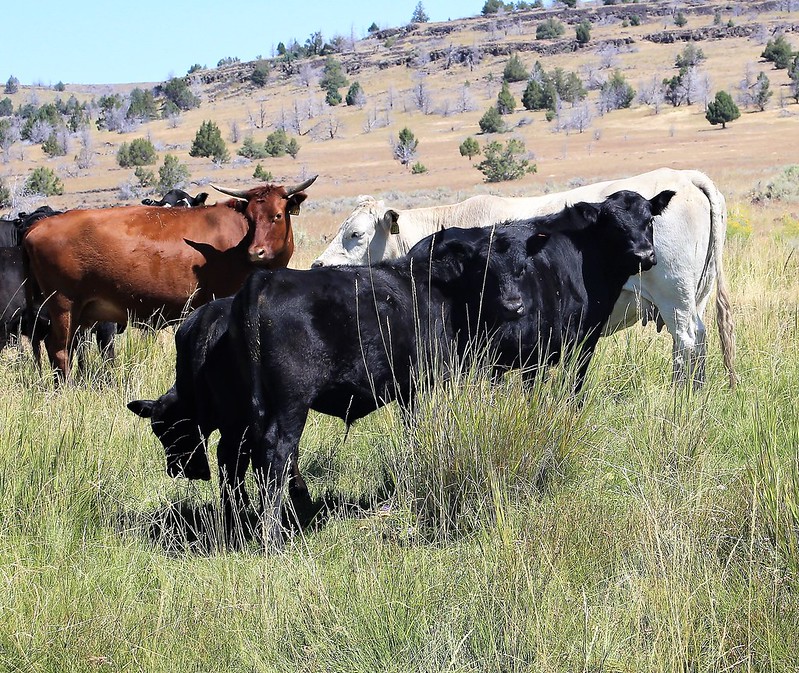
Cattle grazing on a public land allotment administered by the BLM's Eagle Lake Field Office in northeast California.
Credit: Jeff Fontana, BLM
December 22, 2021 - OAKLAND – California Attorney General Rob Bonta on Tuesday joined a bipartisan coalition in support of the U.S. Department of Agriculture’s (USDA) efforts to promote competition in the agriculture industry by strengthening enforcement under the Packers and Stockyards Act. For a century, the Packers and Stockyards Act has served as an important tool to ensure competition and fair practices in the livestock, meat, and poultry industries. However, structural changes, including corporate consolidation and changes in sales and marketing practices, have reduced competition in meat processing markets and driven many smaller meat producers out of business. In today's letter, the coalition argues that aggressive antitrust enforcement is essential to improve supply chain resiliency and encourages USDA to work actively with states to bolster their efforts to investigate agriculture markets.
“Our agrarian abundance and farms are fundamental to California’s economy, communities, and culture,” said Attorney General Bonta. “But recent market consolidation in parts of the supply chain has left consumers and producers to pay the price. As Attorney General, I’m committed to fighting for a fair and competitive economy, and that means reining in monopolistic actors across industries. Today, I’m joining a bipartisan coalition in support of the USDA’s effort to strengthen its antitrust enforcement of the agriculture industry, and I encourage USDA to work with my colleagues and me as we do the same.”
California is an agricultural leader in the United States, generating more than $50 billion in economic output in 2019 alone. Nearly one-quarter of that value comes from livestock production. As a result, California has a strong interest in maintaining a fair and competitive marketplace, supporting the farms that have long been the bedrock of California's economy, and protecting quality and consumer choice in the agriculture industry.
The Packers and Stockyards Act was originally designed to protect poultry and hog farmers and cattle ranchers from unfair, deceptive, and anti-competitive practices in meat markets. In recent decades, however, there has been a substantial trend toward consolidation. For example, in 1977, the four largest beef packers only accounted for 25% of the market. As of 2018, the four largest packers controlled 85% of the market. Similar consolidation has occurred among chicken and pork packers. This consolidation makes it more difficult for producers to get the best price for their products, forcing many smaller cattle, hog, and chicken farms out of the market.
Aggressive antitrust enforcement is essential to restore competition to these vital American markets. To achieve this, the bipartisan coalition today recommends that the USDA:
- Establish a working group to bring together federal and state agencies to discuss issues in the market and facilitate interagency collaboration and information sharing;
- Evaluate whether it has the power, under the Packers and Stockyards Act, to breakup meat processing operations and partner with state antitrust enforcers;
- Invest in “new competitive entrants into meat and poultry processing” and more than strengthen existing “small and very small” facilities;
- Review exclusive contracts established by meat packers and processors, which suppress prices and makes producers more beholden to packers and processors;
- Encourage and examine the proposals for reform put forth by producers’ organizations;
- Update regulations governing what information companies are allowed to collect and share for profit; and
- Establish a grant that state antitrust enforcers could access to support their efforts to investigate and bring antitrust actions in agricultural markets.
Attorney General Bonta joins the attorneys general of Minnesota, Wyoming, Delaware, Hawaii, Idaho, Illinois, Iowa, Maryland, Nevada, New Mexico, North Dakota, Oregon, Rhode Island, South Dakota, and Utah.
A copy of the letter can be found here.
Source: CA. DOJ








